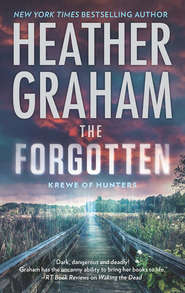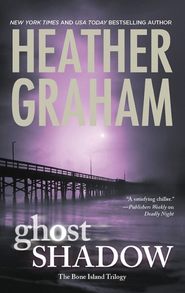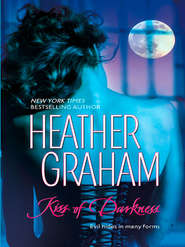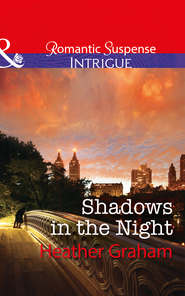По всем вопросам обращайтесь на: info@litportal.ru
(©) 2003-2024.
✖
The Night is Forever
Настройки чтения
Размер шрифта
Высота строк
Поля
“We have more than a suspicion that he was murdered,” Malachi said bluntly.
Dustin stared at him. “How? Why? I’m in the bureau. I know how it works. We’re usually called in when there’s a suspicion that a serial killer is at large or when a killer is crossing state lines.”
“Agent Blake,” Jackson Crow began. “We move in on cases when we’re afraid the truth may never be known because of unusual circumstances. We don’t go barging in as a unit. We send one or two people and they assess the situation for us.”
Dustin was surprised and, he had to admit, disappointed. This didn’t sound like a case that was worthy of the Krewe.
The units had handled many truly unique cases. The sad demise of a man, even a black sheep who’d changed his own life and created a lifesaving enterprise—just didn’t sound like the kind of puzzle that desperately needed to be solved.
He shook his head, baffled. “I need more than you’re giving me. Yes, I’m interested in working with a unit. As you’re well aware, a man can grow weary of finding excuses for knowing what he shouldn’t because he’s managed to have a conversation with someone who’s dead. And can I go in easily? Yes. The Horse Farm is about twenty miles outside the city, but I’d have to go in as myself because I do have friends in the area. But, God knows, that could be easy. Enough people in law enforcement crack—that’s a plausible reason. But I don’t understand how this even came to your attention.”
“My cousin called me, Blake,” Malachi Gordon said. “She works at the Horse Farm and she’s convinced that Marcus Danby was murdered.”
Great. Someone’s relative was upset.
Still...
It was an invitation to get a foot in the door with Jackson Crow and one of his Krewe units.
But if he was stepping in just because someone’s relative couldn’t accept the harsh fact that even the strongest person sometimes failed...
That wouldn’t bode so well.
“Why?” he asked Malachi. “Why is your cousin convinced that Marcus Danby met with foul play?”
“Because, Special Agent Blake, Marcus Danby told her that he was murdered.”
* * *
“I don’t get this horse-assisted therapy,” Joey Walters told Olivia as they walked around inside the pasture. “Unless,” he said, flashing her a belligerent glance, “it’s because our—” He hesitated a minute. She knew the word folks had been on his tongue. But he didn’t have folks anymore. “—our guardians think we’re as stupid as horses and that they’ll somehow fix us? The dumb leading the dumber?”
Olivia lowered her head, smiling, before she looked back at Joey. “Whatever makes you think horses are stupid?” she asked. She was glad to be working. They’d all taken a few days off for Marcus’s funeral, but now they were back.
And she was especially glad to be working because her mind kept racing in denial regarding the autopsy reports.
“They’re not smart—they’ll eat themselves to death if you let them,” Joey muttered.
“Horses have no hidden agenda,” she said. “They have their boundaries, just as we have ours. And for your information, Mr. Walters, horse therapy works well for those who tend to intellectualize everything. You can’t bully a horse. A horse can learn to trust you, but he or she requires you to be trustworthy, as well.”
As if to emphasize her words, Trickster, the twenty-year-old mare she was using with Joey that afternoon, nudged him in the back.
“Hey!” Joey said. But he turned and looked at Trickster. The mare snorted and shook her head, looking back at Joey.
It was a simple exchange—very simple. But Olivia saw something in Joey’s expression and the smile that touched his face. He might be telling her it was all a bunch of bull, but he already cared about Trickster and it was only their second time out.
“You weren’t paying attention to her,” Olivia said. “You brought her out here and then paid no attention to her. She wants to be noticed. She wants you to remember that you came to her.”
“Technically, you brought her out here.”
“Yes, but you brushed her and talked to her and started walking with her. She wants your attention.”
“You taught me that we learn about our boundaries through horses, as well. Most of the time, a horse will want to be in control. Isn’t that what you said? Not to let the horse push you around. She just shoved me!”
“Something else to learn, Joey,” Olivia told him. “Trickster does care about you. She nudged you to get some affection back. You can maintain control—and give her affection. Life is like that, Joey. You can love people—but you can maintain your own thoughts and opinions, as well.”
Joey’s smile deepened. He stroked the horse’s cream-colored neck, and Trickster clearly enjoyed his touch.
But then Joey stepped away. “I’ll get attached to her—and then have to leave her, too,” he said. “I’ll be alone again, like after my parents died.”
“Your parents would never have left you on purpose, Joey. And Trickster won’t leave. You’ll move on, but you can always come back and see her.”
“Everybody leaves,” he said sharply.
Joey had been sent to the Horse Farm because his parents were both killed in an automobile accident. At first, he’d been quiet, grieving, uncommunicative, his uncle had told them. Then he’d begun acting out. An athlete, he’d never been into drinking or drugs.
That had changed.
After his uncle had picked him up at a police station in Sarasota, their hometown, he’d begun to look for help. Joey was enrolled at Parsonage House about ten miles from the Horse Farm. The facility offered horse therapy to their “students.”
“Joey, I’m sorry about your parents. It was tragic and unjust. But like I said, you have to realize that they didn’t desert you, they loved you.”
“It’s not fair!”
“No. Life isn’t fair,” she said quietly. “We learn to cope with it the best we can.” She paused and walked over to stroke Trickster’s forelock. “Look at Trickster, for example. She was a racehorse once upon a time, Joey. She was destined for greatness. Then a jockey whipped her into frenzy and she broke a leg—and she was worthless to the man who owned her. Instead of being grateful for the races she’d won and the money she’d made for him, his owner planned on having her euthanized. But—”
Her voice broke, which surprised her. She believed she’d accepted that Marcus was dead. She hadn’t “seen” him since his death, and she and the rest of the employees at the Horse Farm were moving forward with the work Marcus had deemed so important.
“But?” Joey asked, puzzled.
“But Marcus heard about Trickster, and he bought her—offering her owner more money than the glue factory. He brought her out here, cared for her, and now she’s beautiful, as you can see.”
“They were going to make glue out of her?” Joey demanded, horrified.
“What matters is that she’s here now. And she knows we love her. It took a while, because she was just thrown out in a pasture and allowed to starve, living in constant pain, before Marcus rescued her.”
“But Marcus didn’t stay with her,” Joey pointed out.
“Marcus died, Joey. But he left her in the care of people who would continue to love her.”
Joey took a deep breath and ripped out a strand of grass to chew on. He looked across the landscape and said, “I shouldn’t have made life so miserable for my uncle, huh?”
“He was only miserable because he loves you. And I don’t think he’s miserable anymore because he knows you really do want to live a productive life. You just need to come to terms with what happened.”
He shrugged. At sixteen, he was a tall boy, a good-looking kid in great physical condition. He turned to her with one of his rakish smiles. “You like me, huh?”
“Of course I like you,” she told him.
His grin broadened. “I like you, too. But how I know you like me is that you’ve forgotten the time.”











